Pages for freedom: Book recommendations for Victory Day
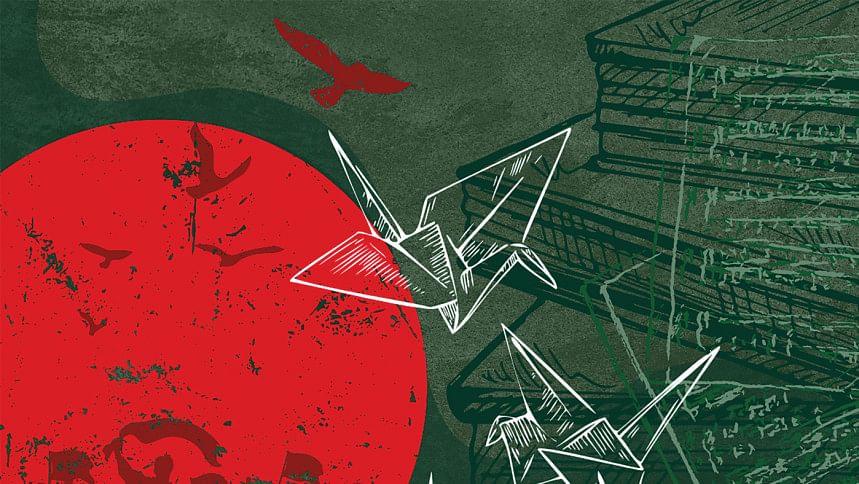
This Victory Day, we asked our readers to recommend stories of the 1971 Liberation War that they wished more people would find. From timeless classics to the more niche reads, this list compiles novels and short stories that explore the preceding violence and the loss and resistance encapsulating the spirit of December 16.
Kakon Sultana
For educators: My go-to text on 1971 is Jahanara Imam's Ekattorer Dinguli. It's a deeply personal and powerful memoir that I believe every student should engage with to truly feel the emotional and human cost of the war. The way she documents her experiences, especially the loss of her son, is heart-wrenching and offers a perspective that transcends history—it becomes deeply relatable and unforgettable.
For readers: One work I wish more people read is Nilima Ibrahim's Ami Birangona Bolchi. It's a brutal yet necessary account of the violence faced by women during the war. These stories often remain on the margins, but Ibrahim's work ensures their voices are heard with dignity and impact. It's not an easy read, but it's essential.
As for the July uprising, Major Rafiqul Islam's writings on the mass movements and political shifts during that time really stood out to me. They bring clarity to the buildup to 1971, showing how every moment of resistance—from protests to uprisings—added fuel to the fire of independence. It's remarkable how ordinary people became catalysts for such monumental change.
Sudeep Chakravarti
The Black Coat by Neamat Imam. It's not go-to, but it should be read more widely, especially now that it isn't officially taboo.
Dystopia is not new to Bengal, or South Asia for that matter. Indeed, Bangladesh is born of a dystopia that Pakistan compelled it to become. Later, very quickly after 1971, and quite like a functioning alcoholic, Bangladesh evolved to embrace layered dystopias as naturally as breathing increasingly polluted air, even as it went about the business of frantic ambition and frenetic growth.
Alongside, there remained the gravity well of the mythology of Mujib alongside the contribution of Mujib to 1971 and beyond. Few writers, though, have had the courage and skill to artistically engage with this history, warts and all, let alone comprehensively portray the formative, exhilarating, crisis-ridden, chaotic, even despotic years after Liberation that undeniably contributed to '1975.'
Neamat Imam did. He wrote The Black Coat. When I first read this novel in 2013, I was transfixed by the story, and its tone and craft. Perhaps Imam could write this because he had the liberty of distance in Canada. That permitted him to fly on the wings of Nur, an uneducated youngster from a remote village who could faultlessly mimic a transformative Mujib speech. It permitted the narrator, Khaleque, who goes from journalist to political impresario when he cashes in on Nur's talent as a livelihood. Mujib could not always travel freely. Nur could and did.
"He had extraordinary power—I felt it under my skin," Khaleque marvels at Nur. "Though he spoke only a few sentences, it seemed he was able to rouse his audiences exactly as Sheikh Mujib had done." And when he no longer could—but that would be giving away the story.
The Black Coat was not easily available in Bangladesh all these years. It is now. To read it in 2024 is a necessary reminder of hubris.
Noora Shamsi Bahar
Shaheen Akhtar writes about the post-war struggles of Birangonas in her short story, "Amirjaan Bibir Shongbordhona". It is the story of four young women who accidentally got enlisted to be trained as freedom fighters during the War of Independence. Later, Bina Saha passed away due to lack of medical attention; her death is seen as "an escape". Mohona Begum, who had married twice, was abandoned by her husbands on the night of both weddings, after the men had heard about how the Pakistanis had tormented her. She fought for having a road named after her without the word "Birangona" in it and refused to attend the Birangona reception in Dhaka because the papers would not write about her heroism; instead, they'd write a sensationalised story of half-truths about her victimhood. No one was willing to give shelter to Razia Begum when she returned with a six-day-old bastard son–no one except the crippled beggar, Bodor Ali, who dissuaded Razia Begum to go for the Birangona reception because of the villagers' unsolicited advice. Amirjaan Bibi, a beggar herself, is the only one who is willing to go to the reception to collect her honorarium of 10,000 taka, and gives a speech where she sheds light on the plight of Birangonas: "Everyone in society says we led the life of whores…Why do you feel disgust towards them? They are humans. They do not deserve such contempt. I'm still fighting a war…" Amirjaan Bibi doesn't receive any honour; upon her return to her village, she sees a local political leader convicted of murder and rape, released from prison, carried on the shoulders by sycophants, with garlands heaped upon his neck.
Since I read and translate Bengali short stories into English, I can recommend Audity Falguni's "Promthes Prometheus". It is a tale of Birangonas—one that deals with Birangonas who had no choice but to become sex workers at Banishanta, a red light district in Khulna, after being turned away by their own families. After her release from the Pakistani bunkers, Fulmoti Karmakar had gotten an abortion with the aid of a local Kabiraj and was given some time to heal before taking on one foreign Babu after another at the Mongla port–Japanese, British, and Greek. She lost the Japanese Babu's child to disease and had another by the Greek Babu–a son she named Promthes Prometheus, who grew up to be a "respectful" engineer, too embarrassed to have a Birangona or a "whore" as his mother. Fulmoti's identity was so shameful that Promthes decided to hide it from his wife, who, upon finding out later, hurled vile insults at Promthes, as if he was responsible for the terrors unleashed upon his mother during the war and for her unfortunate fate afterwards. Promthes eventually commits suicide, after he had secretly gone to supply electrical power lines at Banishanta. Fulmoti is like the port itself–ships come and go, just like her beaus. Even her children are doomed to a life of ill-fate. The only permanence in the life of a Birangona seems to be sorrow.
Khan Mohammad Arefin
I personally find Zahir Raihan's short story "Shomoyer Proyojone" to be a concise and go-to representation holding the spirit of the 1971 Liberation War. Unlike many other contemporary fictional works, Zahir Raihan's short story has a good blend of emotion and skepticism. His narration is quite realistic and precisely critical.
The story illustrates the operations of a young Mukti-Bahini team around the Bengal delta. In a picturesque manner, Raihan shows the war barricade, rounds of gun-fire and the unusual smell of gunpowder in the air. While the story on one hand relates to battle-field; it also narrates the questions of existence that haunts our young veteran at night. The necessity for war, freedom, and liberation are put under strict questioning. The story illustrates comradeship, the concept of hope, and the country-side of Bangladesh.
Sarah Anjum Bari
Anam Zakaria's "1971" was eye opening for me, because she's looking at the war through Bangladesh, India and Pakistan's perspectives and it tells you how it means something vastly different for each country and even for different generations from each country. I thought the author positions herself very well in the book as an outsider, a Pakistani-born researcher, when she's in Bangladesh, and as a person who didn't live through the war, she highlights her distance and lack of familiarity from it. As a reader, you find out about each facet of the war along with the narrator, and this helps remind us consistently throughout the book that history is never one neutral narrative.
Tamanna Islam
"Birangona", a poem from the collection titled Sari Reams (UPL, 2013) by Sadaf Saaz is a poignant, haunting saga of the horrors our women faced during the tumultuous days of 1971. Through its evocative imagery, lyrical desperation, and the quiet strength demonstrated by the "fallen" women of the war, Saaz manages to truly encapsulate the complex narrative of Birangonas, marking it as an essential for us all.

 For all latest news, follow The Daily Star's Google News channel.
For all latest news, follow The Daily Star's Google News channel. 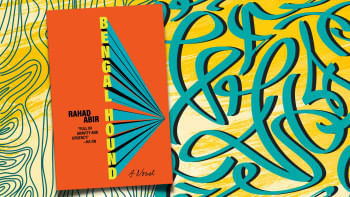

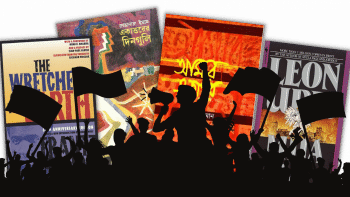




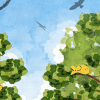
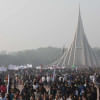
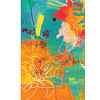


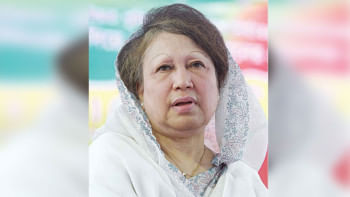
Comments